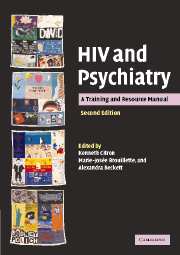Book contents
- Frontmatter
- Contents
- List of contributors
- Preface
- 1 Medical overview
- 2 Cognitive disorders in people living with HIV disease
- 3 General principles of pharmacotherapy for the patient with HIV infection
- 4 Mood disorders and psychosis in HIV
- 5 Suicidal behavior and HIV infection
- 6 Anxiety disorders and HIV disease
- 7 General issues in hospital HIV psychiatry
- 8 HIV and people with serious and persistent mental illness
- 9 Psychotherapy
- 10 HIV and substance use disorders
- 11 Psychiatric issues in pediatric HIV/AIDS
- 12 Uninfected children of parents with HIV
- 13 Psychological issues faced by gay men
- 14 Women and HIV
- 15 Couples
- 16A HIV and cultural diversity
- 16B African Americans
- 16C Latinos and HIV disease
- 16D One heart, two spirit, and beyond: HIV and the people of the First Nations
- 17 HIV in prison populations
- 18 Legal and ethical issues
- 19 Psychiatrist as caregiver
- Appendix I HIV Counselling checklist for physicians
- Index
- References
7 - General issues in hospital HIV psychiatry
Published online by Cambridge University Press: 06 August 2009
- Frontmatter
- Contents
- List of contributors
- Preface
- 1 Medical overview
- 2 Cognitive disorders in people living with HIV disease
- 3 General principles of pharmacotherapy for the patient with HIV infection
- 4 Mood disorders and psychosis in HIV
- 5 Suicidal behavior and HIV infection
- 6 Anxiety disorders and HIV disease
- 7 General issues in hospital HIV psychiatry
- 8 HIV and people with serious and persistent mental illness
- 9 Psychotherapy
- 10 HIV and substance use disorders
- 11 Psychiatric issues in pediatric HIV/AIDS
- 12 Uninfected children of parents with HIV
- 13 Psychological issues faced by gay men
- 14 Women and HIV
- 15 Couples
- 16A HIV and cultural diversity
- 16B African Americans
- 16C Latinos and HIV disease
- 16D One heart, two spirit, and beyond: HIV and the people of the First Nations
- 17 HIV in prison populations
- 18 Legal and ethical issues
- 19 Psychiatrist as caregiver
- Appendix I HIV Counselling checklist for physicians
- Index
- References
Summary
Introduction
People with HIV disease frequently suffer comorbid depressive disorders, anxiety disorders, substance abuse disorders, and cognitive disorders (Dilley et al., 1985; Bing et al., 2001). People with advanced HIV disease often suffer from delirium, particularly in the last weeks of life. Prevalence rates of delirium range from 30–40% of medically hospitalized patients with AIDS (Breitbart et al., 1990). In the hospital setting, it is also common to encounter patients with HIV who have sleep disorders and pain syndromes.
Pain syndromes in HIV-seropositive people are diverse in nature and etiology. The most common pain syndromes such as peripheral neuropathies remain a challenge for almost half the people with HIV, related both to the virus itself and to neuropathic toxicities of HAART (Hewitt et al., 1996).
When mental conditions occur in the context of active medical illness and complicated medication regimens, they are difficult to diagnose and often go untreated. For these reasons, psychiatric consultation can enhance the care of people with HIV who are hospitalized. Psychiatrists can provide expertise in the medical management of psychiatric symptoms on the hospital wards, and they can also serve an important role as liaison between patients, families, physicians, supporting medical staff, social services, and hospital administration. The psychiatrist addressing acute or chronic pain issues in the hospital setting will benefit from knowledge of the psychological, social, and biological components of pain and its management.
- Type
- Chapter
- Information
- HIV and PsychiatryTraining and Resource Manual, pp. 128 - 137Publisher: Cambridge University PressPrint publication year: 2005



